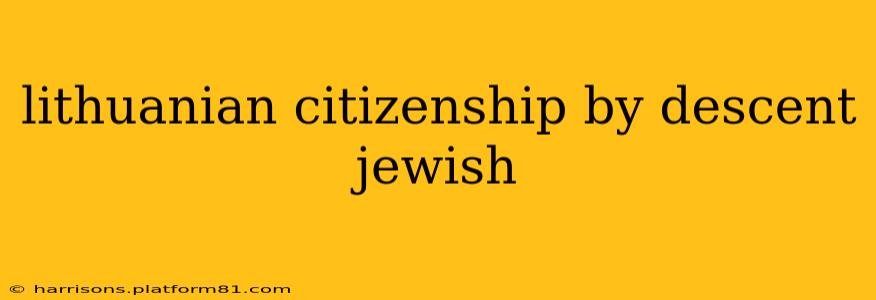Obtaining Lithuanian citizenship by descent can be a complex process, especially for individuals of Jewish heritage whose family history may have been disrupted by historical events. This comprehensive guide aims to clarify the process and address common questions regarding Lithuanian citizenship claims based on Jewish ancestry.
What are the requirements for Lithuanian citizenship by descent?
To claim Lithuanian citizenship by descent, you must prove an unbroken lineage to a Lithuanian citizen who held citizenship before the occupation of Lithuania during World War II. This means tracing your ancestry back to a Lithuanian citizen who possessed citizenship before the Soviet occupation in 1940 or the Nazi occupation later that year. Crucially, the interruption of family lines due to forced migration, the Holocaust, or other historical events does not automatically disqualify a claim, but it does require more rigorous documentation. The key is establishing an unbroken lineage to a pre-1940 Lithuanian citizen.
How do I prove my Lithuanian ancestry if my family records are incomplete?
This is often the most challenging aspect of the process. Many families, particularly those of Jewish heritage, experienced significant disruptions to their record-keeping due to the horrors of the Holocaust and subsequent Soviet occupation. However, several avenues exist for reconstructing family history:
-
Genealogical Research: Thorough genealogical research is crucial. This may involve examining birth, marriage, and death certificates; census records; and other historical documents from Lithuania or other relevant countries. Professional genealogists specializing in Lithuanian and/or Jewish genealogy can provide invaluable assistance in navigating complex records and archives.
-
Family History Interviews: Talking to older family members is vital. Even fragmented memories or stories passed down through generations can offer crucial clues to help piece together your family tree.
-
Community Resources: Jewish community organizations and archives (both in Lithuania and internationally) may hold records or provide resources to aid in your research.
-
Online Databases: Various online genealogical databases and archives may contain relevant records. Be aware, however, that accuracy and accessibility vary widely.
Remember: The more comprehensive and verifiable your documentation, the stronger your application.
Does my Jewish heritage affect my eligibility for Lithuanian citizenship by descent?
Your Jewish heritage does not automatically affect your eligibility, provided you can prove an unbroken lineage to a pre-1940 Lithuanian citizen. The process is the same regardless of religious affiliation. However, the challenges of reconstructing family history are often exacerbated for individuals of Jewish heritage due to the historical context mentioned above. The focus remains on demonstrating continuous citizenship in Lithuania prior to the wartime occupations.
What documents are typically required to apply for Lithuanian citizenship by descent?
The required documents vary slightly depending on the individual circumstances, but generally include:
- Birth certificates: For yourself and all ancestors in the lineage.
- Marriage certificates: For all relevant ancestors.
- Death certificates: For deceased ancestors.
- Proof of Lithuanian citizenship: For the ancestor who held Lithuanian citizenship before 1940. This might involve passport records, census records, or other official documents.
- Passport or national ID card: Your current identification.
- Photographs: Recent passport-style photos.
It's strongly advisable to consult the Lithuanian Embassy or Consulate in your region for the most up-to-date and precise list of required documents.
What if I cannot find all the necessary documents?
If you are unable to locate all the required documents, it does not automatically mean your application will be rejected. However, you will need to provide as much evidence as possible to support your claim. Providing detailed explanations for missing documents, alongside any supporting evidence you can find, is crucial. This is where a genealogist's expertise can be exceptionally helpful.
How long does the Lithuanian citizenship by descent application process usually take?
The processing time for Lithuanian citizenship applications can vary significantly. It’s advisable to anticipate a potentially lengthy process, requiring patience and persistence. Keeping in close contact with the relevant authorities throughout the application process is essential.
This guide provides general information. For the most accurate and up-to-date information, always consult the official Lithuanian government websites and/or the relevant Lithuanian embassy or consulate in your country. Seeking professional legal advice is also strongly recommended.
